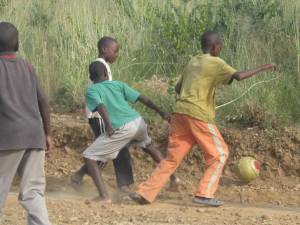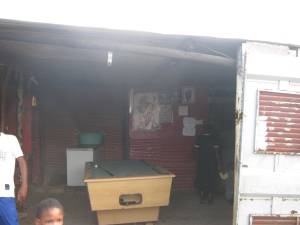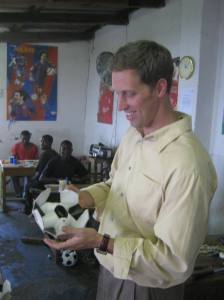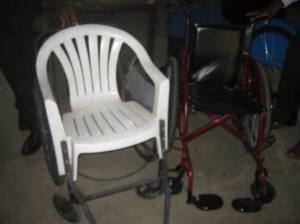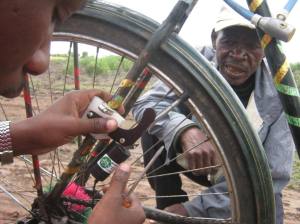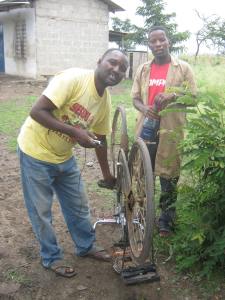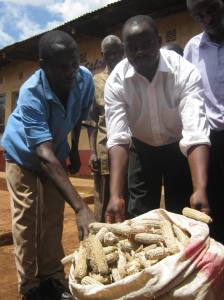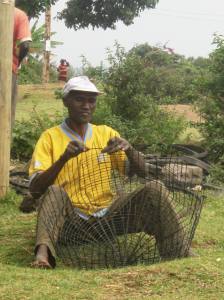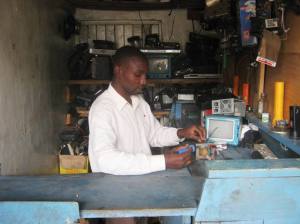April 28, 2010
Advance Work Complete
Greetings Kampala 2 Cape Town super fans, thanks for being patient, we apologize for the delay between posts. We have completed the advance work and the planning team is happy to have traveled the 5,000 miles and come away healthy and with a great new understanding of technology and the power of football to move and inspire people. We are excited by what is forming as we grow closer and closer to the World Cup, but more on that for the next post.
The final steps on our Kampala 2 Cape Town advance trip journey consisted of short stopovers in Windhoek, Namibia and Cape Town, South Africa. It was in these two countries that a purpose for the project really clarified. The project vision sharpened when we got to meet with a potential group of beneficiaries.
One early afternoon in Namibia we came upon youth playing football on the outskirts of the informal settlements of Windhoek, a region called Katutura. The setting was in great contrast to what is found in the well developed downtown area of Windhoek.
Most of the homes in the area are tightly spaced tin homes without reliable electricity or running water. For the young soccer players who lived in these homes, we wanted to know, where would you watch the world cup? We were toured around the settlements and brought to the one of two places in Katutura where the games could be watched.
What we found gave the advance team shivers. We were taken to a stuffy and loud bar, that even In the middle of the day, was occupied with adults consuming alcohol. The TV was quite small, and the viewing space could possibly hold 75 people comfortably. We considered the viewing experience youth might have here and felt a renewed passion for the project.
After taking in the scene at bar and discussing with local community members. We walked over to a wonderful community center at the heart of Katutura. Inside the hall, which could hold close to 200 young people, we discussed the project with local residents, and the hard realizations of what it would be really like trying to put together world cup viewing venues became apparent. The dream of outdoor venues for thousands would raise incredible security risks, and there was possibilities for the party that we saw in the bar to easily take over a public venue. What we would need to plan for smaller gatherings that offered a safe and secure space.
As we headed out of Namibia our new friends posed for a picture, something of importance to take with us as we continued our planning for a once-in-a-lifetime world cup experience.
We landed in Cape Town a few days later then we had hoped and had only a few days to spare. However, we made the most of our time, visiting the new Green Point Stadium and finishing our trip symbolically at the FIFA Football for Hope Center.
Our team is now finalizing the plans for Kampala 2 Cape Town and our next post will be exciting and reveal our path forward…
March 16, 2010
Alive & Kicking in Zambia
In Lusaka, Zambia, the road show advance team has found inspiration and collaboration in two organizations which are creating jobs and incomes in Zambia by locally manufacturing products often imported from outside the continent. The first visit was to a group hand stitching the very object that makes the beautiful game of football possible. Alive & Kicking is social enterprise which produces footballs for Africans, by Africans. In Kenya, we had briefly met with Joel, the country managing director, who offered us words of wisdom and urged us to visit their factory headquarters in Zambia.
In Lusaka we met up with Chand Conaty, a former member of peace corps in Zambia who has returned to become the managing director of Alive & Kicking Zambia. He toured us through the operation and explained how Alive & Kicking uses the game of football as a vehicle for employment and to spread messages of good health and empowerment among the local youth.
Local and international NGOs, as well as government agencies order balls from Alive & Kicking and specify logos and messages they want printed on the balls. Everything, from the printing to the stitching of the balls is done by Alive & Kicking in house. The balls are also available for purchase in local stores and markets.
We visited and spoke with a few of the stitchers, and learned Alive & Kicking is the only organization in Africa which hand makes footballs. They pay their stitchers nearly double the minimum wage in Zambia and the footballs they create last longer than the factory produced imports from outside the country. Many of the hand stitchers are also peer educators, so when balls are delivered they also bring the messages on the balls to life. When the Road Show heads to Lusaka for the quarterfinals, Alive & Kicking will be on hand to distribute footballs, spread the message of healthy living and showcase the benefits of a home-grown social enterprise in Africa.
The second organization the road show toured in Lusaka was Disacare, a wheelchair and mobility center just outside of Lusaka. Like Alive & Kicking, Disacare is a group that is locally manufacturing and trying to boost the local economy and compete against donated imports flooding the market.
Casserdy Magaya, the production manager at Disacare, toured us around their workshop, which has two very important machines, a lathe and drill press, which allows them to manufacture almost all of the wheelchair parts in house. We spoke about why locally producing the technology was so important. The mobility aid market in Zambia, is often saturated with donations from the US and Asia, but the wheelchairs that arrive are often not well suited for the African terrain, and are often wrong for the recipient in the size and design. At Disacare, all recipients are fitted and evaluated before distribution. Problems with that arise with the technology can be fixed locally.
We were then introduced to the workshop manager walked us through the special design of their standard wheelchair, which is maximized for comfort and use on the often rough African terrain. He was especially proud to explain how the hub piece, recycled and modified from used bicycles, increases the life of the wheelchair by months.
Casserdy then had the Discare sales and marketing manager show an example the importance interviewing and understanding the wheelchair recipient. In the case of an urban user who works as a street vendor, the hand cranked tri-cycle wheelchair is the most appropriate solution. The hand crank makes it possible to cross longer distances and the carrier installed into the back makes it possible to carry goods to market. Giving such an urban user a standard wheelchair would be a huge point of frustration for the user.
The comparison of the wheelchair on left donated and imported from China, to the right, manufactured at Disacare highlights one of the points that the road show hopes to bring attention to through our event. When technology is locally produced it stimulates the economy and is almost always the more sustainable in terms of use and maintenance. The imported wheelchair lasted the user 6 months and then started to fall apart. There was no cushion on the seat, and led to sores on the backside. The future user for the Discare wheelchair on the right will be visited at home, interviewed and measured for best fit before receiving the mobility aide.
With everything technically in favor of Discacare, the imported wheelchair still has high prevalence on the market because of the price point. Financing and cost, again and again, has come up as an issue to the advance team, and one that we will explore more in the days ahead.
February 25, 2010
Pedal Power Progress in Arusha
The cell phone, seen charging above, is juicing with just the power generated from a single speed bicycle. In Arusha, Tanzania we have met up `with a main technology partner for the road show, Global Cycle Solutions, and it has been very exciting. But before jumping to our day with the amazing pedal powered cell charger, a little background.
Global Cycle Solutions (GCS) was spun off from innovative research and field work done at the Massachusetts Institute of Technology (MIT). GCS was founded as a for-profit social enterprise by a team of MIT collaborators in July 2009. The students won a top prize at the MIT 100K business plan competition, and from that prize money they were able to launch an African headquarters in Arusha.
GCS sells bicycle attachments which have the ability to create jobs and incomes for individuals living at the bottom of the economic pyramid. Their first product for GCS was a maize sheller, painted blue in the picture above. Most farmers in Sub-Saharan Africa are shelling their maize crop by hand, a labor intensive and time consuming process. The sheller works at a pace 40 times faster than the traditional method.
After checking out the GCS HQ and the sheller we headed out to learn about the exciting pedal powered cell phone charger. The Road Show advance team was lucky enjoy to arrive into Arusha just as the new innovation from Global Cycle Solutions was ready for its first round of product testing. The charger was invented Bernard Kiwia, pictured above. Bernard was working as a bike mechanic when three years ago he attended a design conference called the International Development Design Summit. While there, he met innovators from around the world. When he arrived back into Arusha, he was changed forever and had a new urge to create.
During the months after the design conference, Bernard began to experiment with all types of pedal powered devices and bicycle inspired machinery. Devices ranged from a pedal powered hacksaw, to a windmill from bicycle parts, to the pedal powered drill press seen above. While many of the devices he created did not have commercial appeal, there was one that he knew had market potential, a bicycle cell phone charger. As a working design was born, Global Cycle Solutions was also beginning to develop and a partnership offered the perfect channel for the invention to reach a point of scaling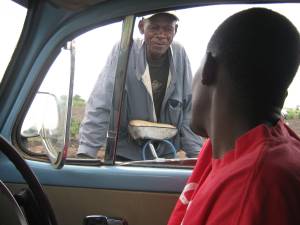
Nearly two years after the Bernard’s conception of the idea, the device is finally ready to hit the market. Bernard invited us into his antique VW Beetle and we set out to distribute the latest version of the design to be tested in a village outside Arusha this is not connected to the grid. After cruising down a dusty road for a few minutes, we came upon a gentleman on a bike and Bernard inquired if he owned a Nokia phone. When he answered positively, Bernard explained in Ki-Swahli what he could offer, and after a look of disbelief, a big grin came over the man’s face.
And so, on the side of a quiet rural Tanzanian road, Bernard armed himself with a screw driver and a pedal power cell phone charger and went to work on his installation. Between the sky blue VW Beetle and open Tanzania countryside, the scene was almost surreal.
The device is actually quite simple, the majority of the parts come from recycled bicycles, and the generator that charges the phone is the same used in old radios. The pricing that Global Cycle Solutions is looking at is around $10 USD.
When Bernard demonstrated that the charger worked and could easily detaches from the bicycle, relieving some theft concerns, what we saw was a very happy customer. After taking down the number of the phone, for further feedback on how the device is running, we jumped back into the Beetle and saw an even bigger grin on Bernard’s face.
The road show crew wondered why Bernard had chosen to do the installation on the roadside and not at a more populated area, but when we stopped at a local shop to install on another bicycle, we saw why. As soon as word got out what Bernard was offering, a crowd gathered and everyone clamored to get a device on their bicycle.
One gentleman, who had no power in his cell phone when we met him, immediately turned over the bicycle and began to charge. Bernard told us that this would often happen when he first installed the device. When we left the scene and headed home, there was a scent of the start to something big in the air.
The Tech Road Show falls at a perfect moment for Bernard, Global Cycle Solutions and the pedal powered cell phone charger and it is a prime example of why we are driven to make our World Cup program happen. To spread technologies like the maize sheller and phone charger to rural villages, you cannot reach them with a TV spot or newspaper advertisement, you must find a way to demonstrate it to them face to face. And not only will the technology proprietors gain from the demonstrations and exhibitions, but perhaps a youth will see the device will go down the road of Bernard adn realize they too have the power of innovation…
February 12, 2010
A-MAIZ-ING Opportunities in Embu, Kenya
The road show crew has finished a wonderful week in Embu, an agricultural hub located two hours north of Nairobi, close to the base of Mt. Kenya. A full day was spent with the Kenera Springs Youth Group, a determined bunch of young Kenyan adults thirsty to find a program which could boost employment and productivity in their community. When we discussed the road show program and the technologies we hope to spread, they became especially excited by the idea of turning maize cobs into usable cooking charcoal. In that appropriate technology they saw an immediate opportunity, telling and then showing the crew how maize cobs, after dried and shelled, are often discarded.
Driving across Embu we saw why the group was so excited, acres and acres of maize farms line the road side, looking almost golden. Substituting maize cob charcoal for wood charcoal offers a business opportunity that would also slow deforestation, which is becoming a major problem in the region. Hundreds of thousands of trees are cut down annually in East Africa so that families can use the charcoal for their cooking needs. Wood charcoal is simply more accessible and affordable when compared to gas or electric , and the production of wood charcoal has been extremely difficult to regulate. The Kenera youth will be investigating how they might be able to start up a maize cob production system in the near future.
Another area of need that the Kenera Youth showed the road show planning committee was water and irrigation. Perhaps thanks to climate change, the rains in the Embu region have become erratic and unpredictable in the past decade. The month of January 2010 was extremely dry, and as the Kenera Youth group toured us around the farms in their community, the amount of plants that were drying out just as they were about to reach harvesting was disturbing and frightening. A lot of enthusiasm was shown for the idea of rain water harvesting and slow drip irrigation.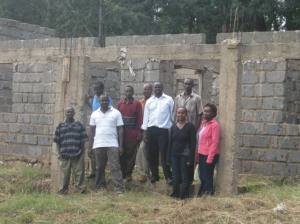
We finished our extraordinary day with Kenera Youth by visiting their soon-to-be completed youth center being built thanks to a government grant. The group asked to be involved closely in the upcoming Road Show so that they might be able to learn more about new technologies that could be disseminated in their community. If they could target specific technologies, be trained in their maintenance and installation, then the center could become a warehouse of knowledge and technology innovation. In the meantime, for our upcoming World Cup event, the group pointed us in the right direction.
The Kirinyanga Technical Institute is the major vocational school in the Embu region and offers a perfect site for a Tech Road Show event. We met with three enthusiastic lecturers who toured us around the campus and described the technical education courses in masonry, water installation, welding, and fabrication as a well as business diplomas and courses in computing and information technologies. They saw the Tech Road Show as an incredible opportunity to bring attention to the importance of technical education, innovation and entrepreneurship.
The 475 student school is growing rapidly, and their 400 acres of land provides more than enough space for a community viewing venue for the World Cup to be set-up. The faculty said their students would be ready to jump on the chance to showcase their institute during the World Cup and they expressed special interested in agricultural technologies, echoing the Kenera Youth’s need for increased innovation in that sector.
We enjoyed our time in Kenya, and can only hope that we can create as many smiles in our next stop in Arusha, Tanzania!
February 6, 2010
Technology Innovation & The Velocity of $$$$
The Road Show crew is traveling through the Rift Valley in Kenya in search of our second locale for a space for the big screen set-up. We spent the last two days in Nakuru, a small junction town five hours from the Ugandan border and four hours from Nairobi. While we are yet to find the right partner or place for our event, the people we have met and the problems we have encountered is sharpening our language on why spreading innovative appropriate technologies in Africa could have a global net benefit.
We met one fellow on the side of the road building chicken coops from used car tires. He was a former soldier who now makes his livelihood by selling the coops at around $4 a piece and around 4 coops per day. The sales provide enough money for him to pay his monthly rent and help feed his family. People buy the coops because when baby chicks hatch they are very difficult to keep in one location and losing them means lost time and revenue.
The recycled tire chicken coop is a great innovation and it’s also increasing the velocity of money in Nakuru. Velocity of money is an economic term that describes how fast money changes from one hand to another. When a farmer uses some of his savings to buy one of the chicken coops, the former soldier receives cash that he in return turn spends at the market to buy fresh vegetables for a family meal. The vegetable seller keeps some of that cash to spend on other necessities, and some of that cash returns to the farmer to buy more vegetables to sell at the market. Now the farmer has increased his/her income and can potentially afford to support more chickens and may in time buy another coop. If the farmer had not purchased the coop and kept the money in savings, the other purchases would have been possible. The theoretical example shows the faster the velocity of money, the more money spreads around the community, and the stronger the economy gets as a whole.
The micro scale example of the chicken coops strengthening economy and livelihoods came back to us while visiting a large farm in the drier area of Nakuru. We were shown a huge field of weeds, where no vegetables can be supported during the dry months from January to April. During this time the price of vegetables on the market goes high because the supplies are limited. Families cut back on their food spending and less vegetables are sold. The farmers have less income, they hold onto their savings, and the velocity of money slows. When introduced the innovations of rain water harvesting, treadle pumps and slow drip irrigation, the farmer agreed that this could boost production during the dry season. If more vegetables could be grown, the price on the market would become more affordable and more sales could be made. The increased income that the farmer received could be invested into more technologies for increased production.
That still left us to consider how to bring the technology innovations sustainability into the community so that they could be maintained and marketed within the cultural context. We got to talking about building this technology economy at Samwell Kironji’s electronic repair shop. Samwell is also a community leader in a local church and we discussed a model that could bring a 21st century technology upgrade. Samwell loved the concept of the road show as a first step, and agreed as Barack Obama said in Ghana, “Africa does not need strong men, it needs strong institutions”. Samwell will think about what steps would be needed to create some type of centralized institution where innovations like rain water harvesting systems could be taught and then offered as a service to the community.
We finished the day by visiting a local school and greeted the future beneficiaries of technology innovation and the increased velocity of African money. While the term “developing community” may be a bogus from a sustainable development point of view, we can happily accept that many African communities have a lot of room to grow, and we will surely need their economies to become a player on the global marketplace if we are to see a recovery from the world wide slow-down…
January 23, 2010
Advance Work
Advance work is an important piece of the road show concept. Every major politician has an advance team which stays one step ahead of the candidate and his or her campaign tour bus. When you see the candidate on TV in a small town bar enjoying beers with the locals, you can be sure someone from the advance team was there a few days before, quietly figuring out exactly which bar stool the candidate should sit on.
Months ago we formed the idea to travel from Kampala to Cape Town during the 30 days of the World Cup and celebrate technology innovation and social entrepreneurship. We decided to dream big and plan for community events in six different countries. Now, to make our dream a reality we cannot simply just hop in a truck at the start of the World Cup and think we will be successful. So, the hard work to plan Kampala 2 Cape Town begins!
Divine intervention may have literally helped determine the site for the Kampala show. A member of the advance team traveled from the US with two huge boxes containing donated sewing machines for a community group near Kampala. When the advance team stopped by to deliver the machines to the Kamwokya Vocational Training Centre (KVTC) just outside Kampala, they quickly realized it was the perfect environment for a Kampala 2 Cape Town Road Show event.
At KVTC we were met by Mildred Mayanga, who is the lead instructor for the tailoring program. She showed us her workshop and described how 35 students each semester learn how to use sewing machines and make a variety of clothes and designs. After they graduate the students can either go into business for themselves or work for an industrial company. The program fit within the mission of the road show: inspiring youth to utilize a technology and improve their livelihood with it.
Culinary arts is another instructional department at the vocational center, and through this unit KVTC teaches young people how to run a catering business by placing them within KVTC’s own catering venture. The unit employs 15 individuals and feeds over 1,000 people a week. The staff told us they were interested in learning how to maintain their own urban garden to grow ingredients for their meals and inquired into how technology might be able to cut down on their biggest cost: cooking charcoal.
In cooking their large meals, KVTC goes through 1,400 kilograms of charcoal a month, at a cost of over $1,000 USD. Wood Charcoal is the primary cooking fuel used at not only KVTC by also by the 50,000 residents within the surrounding community. It is hard to estimate exactly how many trees are chopped down each month to fuel the meals.
Our team immediately introduced one of the technologies we hope to showcase on the road show, an agricultural waste to cooking charcoal system. When we told the KVTC staff a little bit about the technology, they showed us their collection agriculture waste, laying in a heap near their kitchen. The friendly chairman of the program, Charles, said he would be the first in line to learn how they could turn their agriculture waste into cooking fuel so he the process teach students, save money for the catering unit, potentially start a new business, and along the way, save some trees in his country!
We finished our introduction to KVTC be trekking deep into the community and visiting Susan, a graduate of the tailoring program. She is now totally independent and self-sufficient, creating 14 pieces of clothing a day and selling it to a store in a local market. It is success stories like Susan that our show hopes to create.
January 17, 2010
On The Road
Let the celebration begin!!!
Soccer is a religion in Africa, and during the 2010 FIFA World Cup enthusiasm and joy will surge through the continent. This summer’s international soccer tournament is the first ever to be hosted on African soil, and it presents an once-in-a-lifetime occasion to grab the attention of both local African communities and the world. To make use of this unique opportunity, a group of social entrepreneurs are planning the Kampala 2 Cape Town Tech Road Show as an exhibition and celebration of innovative technologies that have the capacity to create jobs and improve livelihoods in African communities.
The driving force behind the Kampala 2 Cape Town project is a desire to destroy the dominant Western narrative that Africa is a “Third World” in need of charity and financial aid from “Developed Countries” to bring an end of poverty. The road show will demonstrate an alternative development path based upon using innovative 21st century technologies to create income generating social enterprises. A fun, informative technology road show during the World Cup will be the catalyst in bringing together a dynamic network of individuals and organizations that understand innovation not aid is the method to mitigating poverty. A grassroots movement to improve the livelihood of the African population has grown organically over the past few years. However, information sharing between the players is weak and is being marginalized by large international organizations with big budgets. With the Kampala 2 Cape Town show we will change the game!
The idea behind the project is simple. Travel between Kampala, Uganda and Cape Town, South Africa during the FIFA World Cup, enjoy the thrills of the soccer matches with a few hundred young people, and during halftime and between matches showcase technologies and social entrepreneurship projects. Technologies currently under consideration for the show are a charcoal from agricultural waste system, slow drip irrigation, pedal powered cell phone charger along with the latest in telecommunication technologies.
To actually carry-out this ambitious idea, it will take months of planning and preparation which begins today. The Kampala 2 Cape Town planning team is in Uganda and over the next two and half months will also be working in Kenya, Tanzania, Malawi, Zambia and South Africa. During this stage we are looking to bring together the best programs and projects to showcase in each country. If you are reading this then you have the opportunity to be a part of the show. In the weeks ahead we will be investigating and discovering the technologies, community partners and sponsors that will make the show a success. If you are interested please get in contact with us by visiting www.kampala2capetown.com or e-mailing info@kampala2capetown.com. We look forward to sharing more in the days ahead!

